- Home
- Anne Frasier
Sleep Tight Page 2
Sleep Tight Read online
Page 2
He thought of the girls who hadn't worked out as returned merchandise. If he'd been required to fill out a return form, he would have marked the box that said, "Wasn't what I expected." Everything else would have fit: size, style, quality, price. All of those would have been okay. Because from the outside, they'd appeared to be exactly what he had in mind.
Funny thing was, once they were gone, he'd missed them for a while. When he went in the house, he could still feel their presence, still smell them. They'd been like one of his migraines. He hated the headaches when he was in the middle of one, but rather enjoyed the heaviness that came afterward, rather enjoyed pampering himself.
He wasn't an idiot. He hadn't gone into this blindly. He'd known they'd require modification, but he hadn't realized it would be so hard. When he'd come across the first one at the nature preserve, he thought she was the one, but she hadn't worked out. Number two had come from the mall. In retrospect, he could see that getting a girl from a mall was a bad idea.
He'd never have been able to turn either of them into the woman he'd wanted them to be. No amount of grafting or forcing could have changed them enough.
So he'd returned them. That's all.
Taken them back to where he'd found them.
I'd like a refund, please.
He'd kept them both for almost three weeks. An adequate length of time. To have returned them sooner would have meant playing a much too active role in today's disposable society. So he'd had to start the quest for the perfect mate all over again, because once he got something in his head, he couldn't let it go. And now he was working on breaking in a new one. Third time's the charm, people always said. But was he fooling himself? Looking for something that didn't exist? Everyone had a perfect mate somewhere, didn't they? And you couldn't find her by sitting at home doing nothing. A guy had to make his life happen.
But a disturbing pattern was emerging. Number three-What was her name? Justine? Yeah, that was it. Justine was beginning to get on his nerves. He wasn't sure why. She wasn't anything like number one or two, he'd made certain of that. In fact, the new one had come with him willingly. (Could she be a slut?) At a bar he'd asked, "Wanna come to my place?"
"Sure." Grabbed her purse.
Too easy. Way too easy. Of course, she didn't much like it when he told her she wasn't leaving his house.
He spent the afternoon grafting rosebushes. A dull blade guaranteed failure, so he liked a sharpened grafting knife. He made the cut to the green stem in one slice, starting at the base and moving to the tip in one single motion. So it wouldn't dry out, he stored the sliced scion in his mouth as he went to work on the rootstock. Then he quickly and dexterously attached the cuts of scion and rootstock, wrapping them with budding tape, stretching the tape almost to the breaking point.
Number three didn't much like it when he took her into the basement and stuffed her in the refrigerator, where she was at the moment.
He was quite proud of his new restraining device. It was an old refrigerator that hadn't worked in years. He'd cut a notch for her neck, tucked her in there when she was bad, and left the freezer door hanging open so he could see her face, talk to her if he felt like it.
Put her in a pumpkin shell and there he kept her very well.
He could tell her heart wasn't in it. She was just going through the motions, like an actress. (Or a slut?) The little actress was actually what he'd started calling her. And now he spent a large part of his day thinking about killing her, chopping her up, using her for compost. He actually began to dream about cutting off her fingers and grafting grapevines to her stubs. As the vines grew, he tied her to an arbor where her feet shot out roots that dug deeply into the ground. Fruit came on thick and lush, growing between her thighs.
He picked the fruit and ate it, blood dripping down his chin while she smiled lovingly at him from the wooden trellis.
Chapter 2
The 757 came in low over the scattered suburbs and blue, reflecting lakes that stretched to the horizon. In the far distance stood the IDS Center. In front of it, the Foshay Tower. As she stared out the window at the beauty of Minneapolis, Mary's stomach clenched. Instead of feeling a glow of sentimental attachment upon seeing the skyline, she experienced something that felt uncomfortably like fear.
She loved her hometown. Whenever someone asked where she was from, she would tell them Minneapolis even though she'd been born in Pennsylvania.
When Mary was seven and Gillian four, they moved to the cozy Minneapolis neighborhood of Lynwood Park, where they quickly fell under the spell of a charming, two-story Tudor. The girls had their own space, upstairs, in tree-shadowed rooms with green-trimmed windows. On hot summer days, they read books their mother recommended, such as Silent Spring and Anne Frank: The Diary of a Young Girl. In the house, in the yard, the sisters played together for hours.
Then Fiona Portman moved in, across the street and up three houses.
Fiona was someone everybody noticed, especially boys and grown men. Even at ten years old, the beauty she would become stared out from a child's face. She had shiny black hair that fell from a white center part, a perfect contrast to her pale skin and thick-lashed blue eyes. The moving van had hardly pulled away when Mary and Fiona began their friendship, whispering, clinging to each other, and laughing so hard they fell into a tangled heap. From that day on, they were inseparable. People would see them walking down the sidewalk, and even though the girls looked nothing alike, neighbors were apt to say with a chuckle, "Here come the twins. Joined at the hip." Looking back, Mary was always amazed and mystified by the strength of their union, by the power of a youthful friendship that was frightening and inexplicable in its steadfast unity.
Mary would often find her volatile younger sister staring at them from a distance, arms crossed at her chest, acting jealous and abandoned and left out. At the beginning, Mary would ask Gillian to join them, but she always refused, and eventually Mary quit asking.
Fiona vanished on October 29, the day of her sixteenth birthday. Even now, if Mary saw someone cutting cake with fluffy white frosting, she got a freeze-frame image in her head of Fiona's body, half-covered by dead leaves.
The birthday party was under way at Fiona's house. Mrs. Portman, arriving with the tidy presence of Betty Crocker, presented a white birthday cake to the gathering of classmates. When Fiona didn't show up to blow out the candles, Mrs. Portman shrugged and fed the cake to the hungry kids. An hour later, when Fiona still hadn't shown up, her mother began to worry. The Portmans' backyard rolled down a gentle slope to a dark, secret world guarded by ancient oak and hickory trees. When younger, Mary and Gillian, and later Fiona, had played in those damp, mossy, mysterious woods, often remaining until the mosquitoes and lightning bugs came out and their mothers called them home.
The house was searched from top to bottom, bottom to top. Then the teenagers, boys and girls, went running into the woods, calling Fiona's name. Mary laughed and spun around addressing the trees, telling her friend to come out, quit hiding-the joke was over and everybody was going home.
"We're going to open your presents if you don't show up!" Mary threatened. "We're going to take them back home with us!"
The oak leaves were deep enough to disguise the terrain. Mary would think she was on flat ground, but then she would step into a hole and sink to her knees. Sometimes tangled tree roots tripped her and sent her sprawling.
She thought about the place where she and Fiona used to play, a tree house her father had made. Briefly disoriented, she finally found the tree. It looked different, not so welcoming.
"Fiona!"
Mary circled the tree, looking upward into the spi-raling branches. A heavy, black, snaking root snagged her foot, pulling her down into another pile of leaves. Mary put out her hands to catch herself, one palm connecting with something strange, something solid yet soft.
There, almost under her, was the body of her best friend.
Mary stared, still hoping it was a joke, a trick.
Fake blood, fake blood, fake blood.
Fiona was lying on her stomach, her face in profile, her blue lips parted, one eye open, unfocused, staring at nothing, at no one. Dried blood clung to her nostrils, to the side of her face, fanning out like thick black cat whiskers.
And Mary knew, with a certainty that would become the driving force in her life, with the certainty that evil was the polar opposite of goodness and that it could lurk in the most innocent of places, that Fiona was dead.
The airplane wheels hit the ground, bringing Mary back to the present. The jet engines reversed, and hydraulic brakes engaged. The craft bobbed in a heavy, ungainly way, awkward now that it was no longer airborne.
The FASTEN SEAT BELTS sign went off. Metal seat belts clicked, and passengers began moving about, gathering up their belongings, preparing to disembark.
People often accused Blythe Cantrell of having found the secret of eternal youth. Maybe it was Mary's mother's penchant for constant change that kept her young, and the fact that she was a lifelong learner, always immersing herself in something new. There is so much to experience, she said.
Her hair was a different color and style from the last time Mary had seen her, gone from a red bob to something shorter and multicolored in shades from white to brown. She wore a gauzy skirt that fell to her knees in bright colors, her toenails painted red in brown leather sandals. She was adorable, and she looked about twenty-eight.
If her life had gone differently, Mary might have flown to Minneapolis unannounced so she could surprise her mother. But the practical Mary had called first. She'd told Blythe she'd rent a car, but Blythe had insisted upon picking up her daughter at the airport.
It was a strange thing, hugging a mother who was much smaller than her child. Mary let herself be pulled into her arms, careful of her injured shoulder, which was aching.:
Together they took the escalator to the baggage area. In the congestion of people, they made small talk.
"They've added a new terminal, more parking, more places to eat," her mother said.
"I've always liked this airport." But then, Mary liked all airports. Airports brought you back, but better than that, they took you away. She'd spent a large part of her life in airports and on planes. Always moving on to the next case.
They gathered her luggage, one large bag and one small, and headed for parking. A few minutes later they were exiting the ramp and getting on 494.
A major problem with the Twin Cities, Mary remembered, was getting from point A to point B, and then finding a place to park once you finally arrived. Everybody traveled by car because they were either too cool for buses or knew the buses became mired in traffic like everything else.
"They're finally putting in the light rail," Blythe said, jockeying for position so she could hit the next exit ramp.
"They've been talking about it since the sixties."
"Eventually, the tracks will extend from Northfield to Saint Cloud."
Mary figured they'd all be dead by the time that happened, but she didn't want to dampen her mother's enthusiasm.
It was said that Minnesota had two seasons: winter and construction. Even though it was early October, roadwork was still in full swing, and they had to take detour after detour. At a stoplight, a bumper sticker on a nearby car brought back a memory. "Remember the summer we went to Disney World?" Mary asked.
"I didn't want to go," Blythe said with a smile. She hadn't approved of the place, calling it a "giant, sterile, artificial wasteland of the mind and soul," but Gillian had begged and begged, and one summer Blythe had finally broken down and taken them to Florida. Until then their vacations had been planned to invoke thought and provide mind expansion. To Blythe's chagrin, the trip to Disney World had been wonderful, and she'd later admitted that sometimes it was good simply to enjoy the moment.
Their street ended in a cul-de-sac-there was no way to avoid going past Fiona's house.
"Do the Portmans still live there?" Mary asked. "They divorced, but Abigail won't sell the place." Blythe pulled the car into the driveway, cutting the engine. The river birch that Mary and Gillian had planted when they were in Girl Scouts had grown as tall as the house.
Except for a neglect that betrayed the absence of a man and the lack of things men did-like keeping the window trim painted and maple seeds from sprouting in the soffits-the house looked much like everyone else's on the block, all stucco-sided Tudors. But when you stepped inside, you entered the world of Blythe Cantrell. A flower child who'd refused to become a yuppie, Blythe spent her time creating her own unique brand of pottery, which she fired in a studio that used to be the garage. During the snow-bright, bitterly cold Minnesota winters, Mary and Gillian had spent time in the studio with their mother, slicing air bubbles out of clay while Blythe spun her foot-driven potter's wheel.
Inside the house were plants that reached the ceiling, oriental rugs spread over hardwood floors, antique furniture, and weird lamps that cast muted orange light. On the walls hung various pieces of art that Blythe had purchased over the years from struggling artist friends. The eclectic disarray flowed into the kitchen, where Blythe poured some iced tea and produced a plate of scones. She put everything on a tray and carried it to the little bistro table in front of the sliding doors that overlooked the lush, overgrown backyard and deck.
Her daughter, her tall, beautiful, stoic daughter, stood looking out at the bird feeders. Her face was pale, and it seemed as if she might be in pain, but Blythe knew if she asked, Mary would never admit to such a weakness.
Blythe's husband, a war correspondent, had been killed while covering an uprising in South Africa. Mary was eleven at the time, and had adored her father. It had been hard on them all, but they'd come out of it eventually. Then Fiona was killed. Her death marked the beginning of an awful change in Mary. A change that intensified six months later, when Gillian began writing and visiting Gavin Hitchcock-the imprisoned man who'd killed Mary's friend.
Why had Gillian done it? Blythe still wondered. Out of spite? To get Mary's attention? Or did Gillian, who had known Hitchcock since grade school and had befriended him since junior high, really believe her childhood friend was innocent?
It was hard to remember what Mary had been like before Fiona's death. Blythe often had to think hard, to pull the old Mary to the front of her mind so she could see her the way she used to be.
When Mary had announced her plans to become an FBI agent, Blythe had rejoiced because at least she'd finally wanted something. It meant she was looking toward her future once more. But as years passed, Blythe wondered if it had really been the best thing for Mary. Sometimes feeding an obsession only led to self-destruction.
Mary eased out of her dark, knee-length coat and hung it over the back of the chair. Under it she wore a short-sleeved white blouse and a black leather shoulder holster and gun.
"Is something wrong with your arm?" Blythe asked, noticing how carefully her daughter moved.
"I injured it during a raid," Mary said a little too casually as she sat down. "A stupid mistake."
"Why didn't you tell me?"
"It wasn't anything."
Blythe suspected her injury was more serious than she let on. That's the way Mary was-quiet and secretive.
Blythe had visited her daughter in Virginia several times, yet no matter how often Blythe saw her with a weapon strapped to her tall frame, she could never get used to it. She'd never allowed guns in her house, never allowed her girls to even pretend to have a gun.
Blythe had always thought of Mary as strong and capable, fearless. But at the moment she looked exhausted and vulnerable.
"Is it so awful being here?" Blythe blurted out. It hurt to know her daughter didn't want to come home. "Good things happened here. A lot more good than bad. Don't ruin those memories for yourself."
Mary looked up. "It's hard," she said quietly.
Blythe was surprised by her admission and felt her eyes begin to t
ear. She blinked rapidly. "I know. I just want you to be happy."
"I'm not sure I'm the kind of person who can be happy."
Blythe pulled her tea nearer and began drawing patterns in the condensation on the glass. "You used to be happy. When you were little you were happy. Always laughing. I think you have the capability to be happy again if you allow yourself the luxury."
"It's the curse of violent crime agents. We spend so much time around death and evil. Pretty soon everything is bad."
"Have you ever thought of doing something else?"
"Please. Don't start that again."
Blythe glanced at the clock. It was later than she'd thought. She reached across the table and squeezed her daughter's hand. "Mary, Gillian's coming over." She braced herself for an unpleasant reaction.
Mary stared at her in disbelief. "She isn't living here, is she?" she asked, demonstrating the first real emotion she'd shown since stepping off the plane.
"No, she has an apartment in Dinkytown."
Mary dropped back against her chair in relief. "What about Hitchcock?"
"When he got out of prison, Gillian helped him find a place in St. Paul. The Midway area, I believe."
Mary nodded and pursed her lips. "No surprise there." She leaned forward, her gaze suddenly intense. "You know he did it, don't you? You know he killed Fiona."
"Of course he did. I think deep down, Gillian must know it, too. She doesn't talk about him much. It upsets me. I don't like her hanging around somebody like that. I've always tried to be open-minded and embrace everyone, but… a killer?… I can't do it."

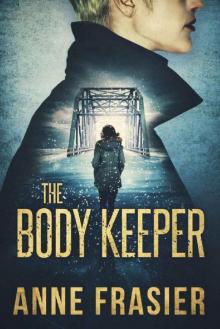 The Body Keeper
The Body Keeper Hush
Hush Play Dead
Play Dead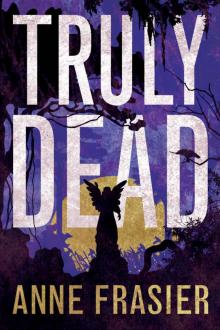 Truly Dead
Truly Dead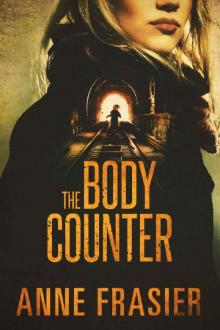 The Body Counter
The Body Counter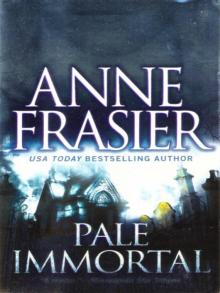 Pale Immortal
Pale Immortal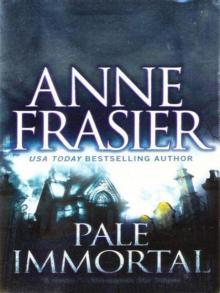 (2006) Pale Immortal
(2006) Pale Immortal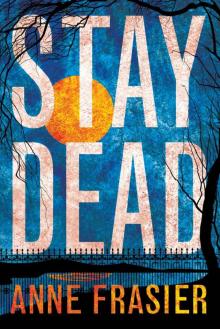 Stay Dead (Elise Sandburg series)
Stay Dead (Elise Sandburg series) Sleep Tight
Sleep Tight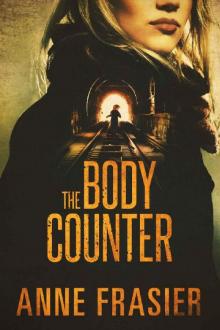 The Body Counter (Detective Jude Fontaine Mysteries Book 2)
The Body Counter (Detective Jude Fontaine Mysteries Book 2)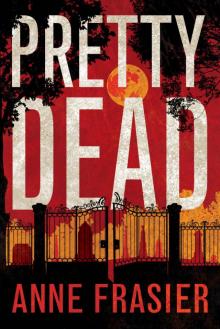 Pretty Dead
Pretty Dead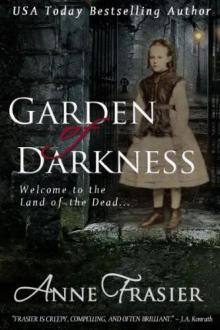 Garden of Darkness
Garden of Darkness